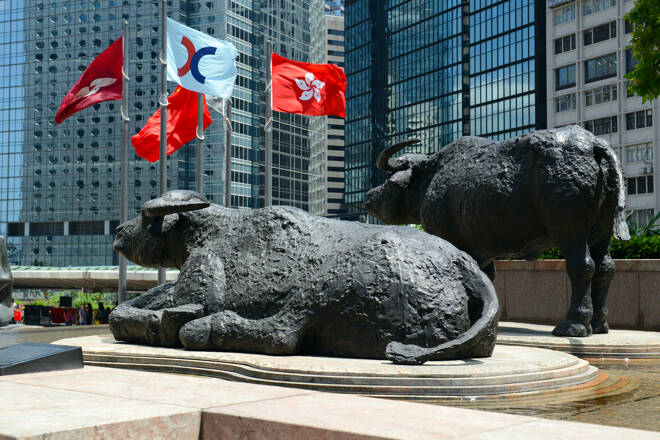Advertisement
Advertisement
Hang Seng Index, ASX 200, Nikkei Index: HSI Dips with Trade and PBoC Moves in Focus
By:
Key Points:
- It was a mixed start to the Tuesday, July 23, Asian market session.
- Overnight gains across the US equity markets set the tone for the Tuesday Asian session.
- The Hang Seng Index and Mainland China struggled with concerns about trade and the Chinese economy.
US Markets: Tech Sector Rebounds
On Monday, July 22, dip buyers returned after last week’s global IT outage.
In the US equity markets, the Nasdaq Composite Index and the S&P 500 rallied 1.58% and 1.08%, respectively, while the Dow gained 0.32%.
Tech stocks reversed their losses from Friday despite 10-year US Treasury yields ending the session 13 basis points higher.
The 2024 US Presidential Election Race
On Monday, the US Presidential Election Race was a focal point after President Biden’s withdrawal. According to the latest polls from FiveThiryEight, Donald Trump held a 2-point lead over Kamala Harris on Monday. However, online betting sites lowered their pricing for a Trump victory.
AMP Head of Investment Strategy and Chief Economist Shane Oliver commented,
“Following Biden’s decision not to run, betting markets (PredictIT) have the Republicans v Democrats probability of winning back to where it was prior to the assassination attempt.”
Investors may let the dust settle from the Biden withdrawal before assessing the chances of a Democratic Party victory.
Trade Tensions and China Growth Concerns
On Monday, July 22, the People’s Bank of China surprised the markets with policy measures to bolster the Chinese economy. Cuts to loan prime rates and the Reserve Requirement Ratio highlighted Beijing’s concerns about slower-than-expected growth in Q2 2024. The Chinese economy expanded by 4.7% in Q2 2024 after growth of 5.3% in Q1 2024.
Nataxis Asia Pacific Chief Economist Alicia Garcia Herrero commented on the policy measures, saying,
“China’s rate cuts right after the #Third Plenum are important since they could point to a policy change. No change in MLF before the Third Plenum and a very vague readout of the Plenum on Thursday but a much constructive full document on the Plenum this Sunday […] and rate cuts today. This Third Plenum may have been worth after all, at least for the leadership to understand how urgent measures are.”
Rising threats of a US-China trade war also pressured demand for Hong Kong and Mainland China-listed stocks. A Trump victory could rekindle US protectionism. Waning domestic demand in China and deteriorating trade terms could test China’s 5% growth forecast for 2024.
Hang Seng Index and Mainland China Stocks Trend Lower
Meanwhile, the Hang Seng Index declined by 0.10% on Tuesday morning. Tech stocks contributed to the morning losses.
The Hang Seng Tech (HSTECH) Index was down 1.09% on Tuesday. Alibaba (9988) and Tencent (0700) fell by 0.40% and 0.67%, respectively, while Baidu (9888) was down 0.45%.
Mainland China’s equity markets extended their losses from Monday despite the PBoC’s monetary policy maneuvers. The Shanghai SE Composite Index and CSI 300 fell by 0.52% and 0.87%, respectively.
Nikkei Index Advances on Tech Sector Rebound
The Nikkei Index advanced by 0.25% on Tuesday, although a weaker USD/JPY limited the gains. On Tuesday, the USD/JPY was down 0.25% to 156.609, extending its losses from Monday.
Tokyo Electron Ltd. (8035) gained 0.30%, while Nissan Motor Corp. (7201) rose by 0.92%.
ASX 200 Climbs on Tech Sector Rally
The ASX 200 Index rose by 0.70% on Tuesday morning, tracking the overnight gains from the US. Tech stocks led the way, with the S&P ASX All Technology Index (XTX) rallying 1.56%.
However, gold and oil stocks limited the upside, with Woodside Energy Group Ltd (WDS) and Northern Star Resources Ltd. (NST) seeing losses of 2.87% and 0.35%, respectively. Investors reacted to overnight Gold and WTI Crude Oil price losses.
Investors should remain alert with US politics and the Chinese economy remaining in focus. Closely monitor the news wires, real-time data, and expert commentary to manage trading strategies accordingly. Stay informed with our latest news and analysis to manage positions across the Asian equity markets.
About the Author
Bob Masonauthor
With over 28 years of experience in the financial industry, Bob has worked with various global rating agencies and multinational banks. Currently he is covering currencies, commodities, alternative asset classes and global equities, focusing mostly on European and Asian markets.
Advertisement
